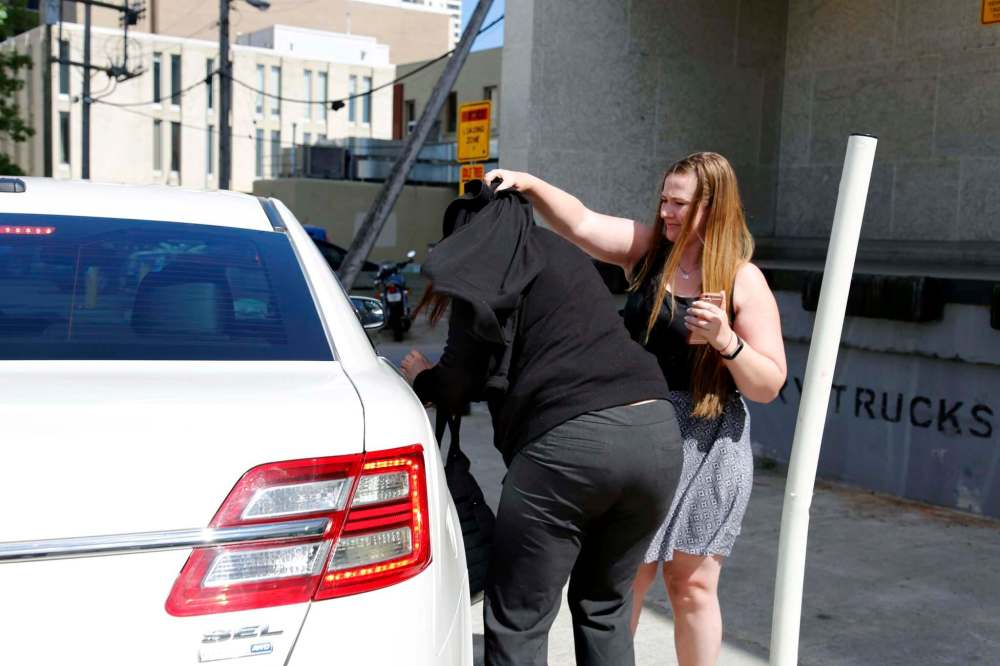Mother gets 8.5 years in dead baby case
Giesbrecht cited as Canada's 'worst offender' for this type of crime
Advertisement
Read this article for free:
or
Already have an account? Log in here »
To continue reading, please subscribe:
Monthly Digital Subscription
$0 for the first 4 weeks*
- Enjoy unlimited reading on winnipegfreepress.com
- Read the E-Edition, our digital replica newspaper
- Access News Break, our award-winning app
- Play interactive puzzles
*No charge for 4 weeks then price increases to the regular rate of $19.00 plus GST every four weeks. Offer available to new and qualified returning subscribers only. Cancel any time.
Monthly Digital Subscription
$4.75/week*
- Enjoy unlimited reading on winnipegfreepress.com
- Read the E-Edition, our digital replica newspaper
- Access News Break, our award-winning app
- Play interactive puzzles
*Billed as $19 plus GST every four weeks. Cancel any time.
To continue reading, please subscribe:
Add Free Press access to your Brandon Sun subscription for only an additional
$1 for the first 4 weeks*
*Your next subscription payment will increase by $1.00 and you will be charged $16.99 plus GST for four weeks. After four weeks, your payment will increase to $23.99 plus GST every four weeks.
Read unlimited articles for free today:
or
Already have an account? Log in here »
Hey there, time traveller!
This article was published 14/07/2017 (3075 days ago), so information in it may no longer be current.
An “unprecedented” case of hiding the remains of six dead babies has ended with an 8.5-year sentence for a Winnipeg mother.
Andrea Giesbrecht, 43, has just under eight years left to serve behind bars after being given credit for the time she spent locked up before she was released on bail. She displayed no visible emotion and exchanged a brief word with her husband as court sheriff’s officers arrived to take her into custody.
“These were not victimless crimes,” provincial court Judge Murray Thompson said in his decision Friday, speaking about the lengthy police investigation and court case that began after Giesbrecht failed to make rental payments on the storage locker that contained the dead bodies within bags and plastic totes.

“It is difficult to describe the disturbing impact of viewing the remains or photographs of fully formed, decomposing fetuses and their autopsies. There are just some things you cannot unsee,” Thompson said.
Giesbrecht has never shown remorse or offered any explanation for the crimes. She was convicted on six counts of concealing a child’s body after the decomposed remains of five boys and one girl were discovered by staff at a McPhillips Street U-Haul storage facility in October 2014. She faced a maximum 12-year sentence.
“Despite her pathological behaviour,” Giesbrecht has not been diagnosed with a mental disorder, the judge said, but she does have a record of dishonesty. She was twice convicted of fraud over $5,000 and has an admitted gambling addiction for which she’s undergoing counselling.
Defence lawyer Greg Brodsky said he would recommend his client appeal the sentence, of which Giesbrecht has 7.8 years left to serve. She spent about six months in custody after her arrest, for which she was given time-and-a-half credit. Her defence lawyer had argued his client should avoid further jail time. He said Friday she was upset that she would be away from her two teen sons for so long.
“She feels very bad. She’s separated from her family. She didn’t want to put her family through all this,” Brodsky said outside court following the judge’s decision Friday.
Thompson imposed the sentence Friday afternoon after he dismissed a last-minute attempt by Giesbrecht’s defence team to have the charges tossed because of court delays. He was clear about Giesbrecht’s “history of lacking empathy,” and the dignity she stole from the babies after they were born.
“Giesbrecht concealed each of these six pregnancies, even from her husband. She bagged each of the bodies, sealed them or encased them in cement or powder, all in an effort to contain the smell of human decomposition and decay,” the judge said in his decision.
‘There are just some things you cannot unsee’– provincial court Judge Murray Thompson on the impact of evidence presented at trial
Although the bodies were too badly decomposed for investigators to figure out how the babies died or whether they had ever taken a breath, medical experts testified they were likely born alive, at or near full-term. They were all between 34 and 42 weeks gestation and there was no evidence that Giesbrecht tried to self-abort the pregnancies. Any attempt to do so at such a late stage in the pregnancy would likely have had life-threatening consequences for Giesbrecht, court heard.
“The harm to society is significant,” Thompson said. “And perhaps most aggravating, she has defeated the police investigation into the cause of death of six infants.”
There has never been a case in Canadian law involving so many charges of concealing infants’ remains, making Giesbrecht “the worst offender” for this type of charge, Crown prosecutors had argued.
Each count carried a maximum two-year sentence, and the judge decided Giesbrecht’s “extreme” moral culapability would have increased after the first time she disposed of an infant’s body. He sentenced her to six months for the first count, one year for the second, and two years each for the remaining four dead fetuses.
A 9.5-year sentence would have been “crushing” to Giesbrecht because of her family and work involvement, Thompson said, reducing the total sentence to 8.5 years.
Outside court Friday, Brodsky continued to refer to the six dead babies as “products of conception” and emphasized that Giesbrecht was never charged with a homicide offence.

Brodsky also said he was “taken aback” that to inform his decision, the judge preferred a probation officer’s description of Giesbrecht as “verbally aggressive and angry” during a meeting after she was convicted over a “glowing letter of support” written by her bail supervisors at the Elizabeth Fry Society of Manitoba. The judge said the Elizabeth Fry Society letter amounted to advocacy while the probation officer was “an objective source of information.”
In interviews with the probation officer who prepared her pre-sentence report, Giesbrecht didn’t talk about the offences. Citing legal advice, she also declined to discuss her history with pregnancy.
katie.may@freepress.mb.caTwitter: @thatkatiemay

Katie May is a general-assignment reporter for the Free Press.
Our newsroom depends on a growing audience of readers to power our journalism. If you are not a paid reader, please consider becoming a subscriber.
Our newsroom depends on its audience of readers to power our journalism. Thank you for your support.
History
Updated on Friday, July 14, 2017 8:50 PM CDT: adds cropped photo for tile



